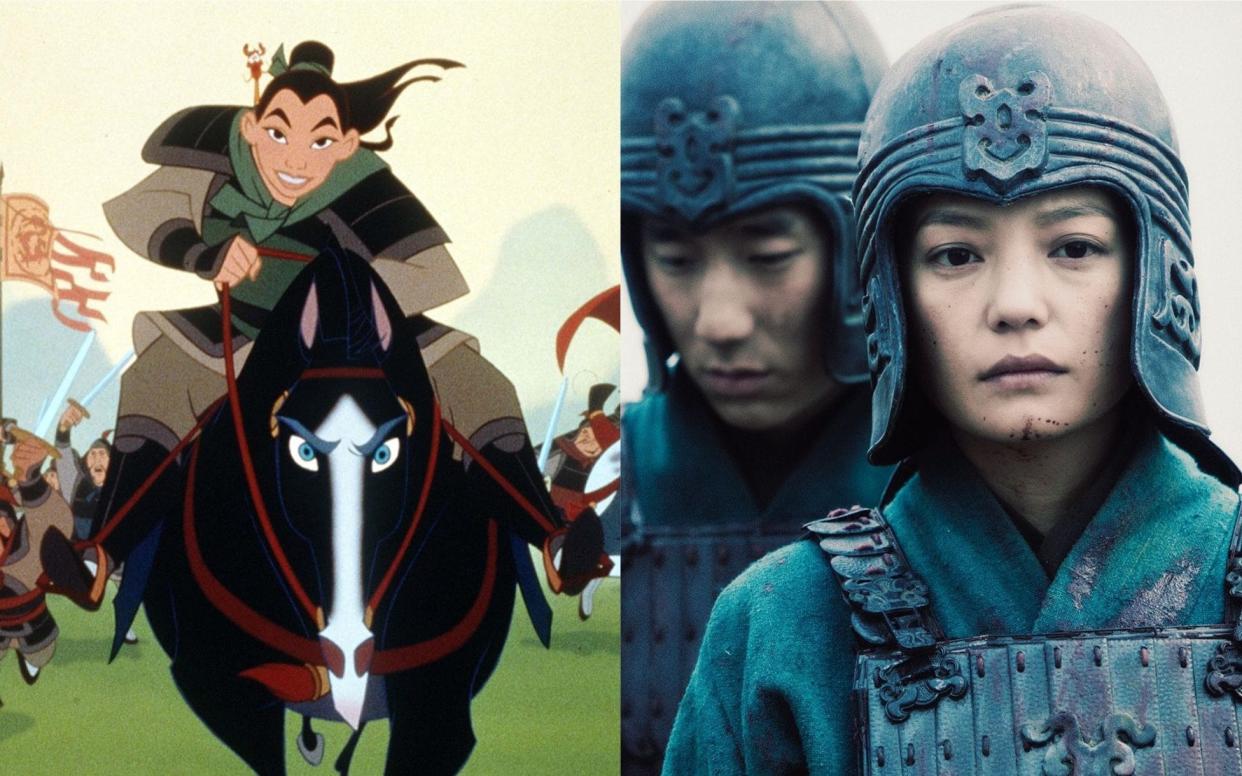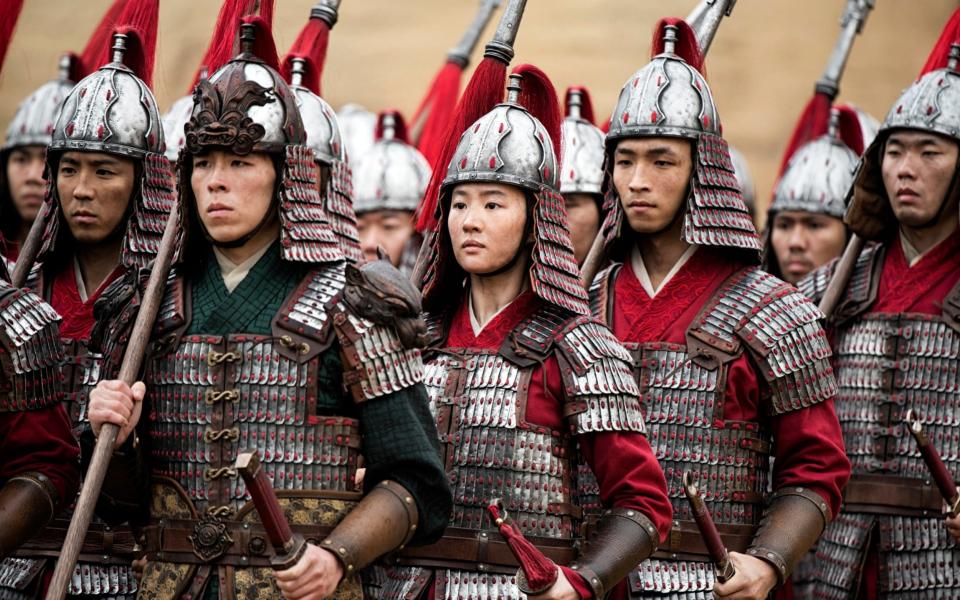The true(ish) history behind Mulan – and her Beijing-baiting heir

In the months since the cancellation of its March release date – soon to be followed by its rescheduled July date, then its August one – Disney’s eye-wateringly expensive live-action remake of the 1998 animation Mulan has sometimes felt like a myth.
The film is now finally entering the real world: it’s out on Disney+ on today. But in one important sense, its mythical aura endures. Disney based its beloved female action hero on an authentic figure from Chinese folklore, the warrior Hua Mulan.
Her story first appears in the Ballad of Mulan, a 300-word poem transcribed in the sixth century but more likely set in the fifth, during the tempestuous Northern Wei dynasty. The story it spins will be familiar to any Disney fan: when the threat of invasion requires each family to provide one man to fight, a young woman disguises herself in male clothing and joins the army in place of her elderly and ailing father. In a triumph for proto-feminism, she becomes a brilliant and celebrated warrior.
The 1998 Disney animation mucked around liberally with the story. The invaders depicted in the Ballad, a loose confederation of tribes from Mongolia known as the Rouran, were transformed into a fearsome mounted army of Huns – as in Attila, the leader who died choking on his own blood in a drunken stupor on his wedding night. In fact, the Huns were busy ransacking what remained of the Roman Empire in Europe for most of the fifth century.
The animation also makes much of Mulan’s initial hopelessness as a soldier; her transformation from hopeless fool to bamboo-wielding expert at the military camp is the best sequence of the film, not least because I’ll Make A Man Out of You, one of Disney’s catchiest numbers, is thundering in the background. But according to the Ballad, Hua Mulan had studied martial arts since childhood. By the time she joined, Mulan could probably spear a fish or throw a punch with the best of them.
In the film’s briskness (it comes in at just under 90 minutes), Mulan’s time at war feels breezy. There’s a long march, a big battle, and then it’s pretty much over. But in the Ballad, she fights for 12 years, somehow managing to conceal her gender from her fellow soldiers for the entire period. (The poet gives no clues as to how she achieved this singularly impressive feat.)
Some of the darker and more troubling elements of the Mulan legend are also missing from Disney’s upbeat tale of female transgression. As Professor Lan Dong of the University of Illinois observes of the original legend: “Mulan’s transgression (pretending to be male) is justified (to save her father and serve her country); verified (to achieve success in military service); and mitigated in the end (to return home and resume her life as a woman).
“She is extraordinary,” Dong writes, “but non-threatening to the social structure.” In other words, Mulan’s transgressions make for an entertaining tale, but they are rather less proto-feminist than Disney makes out.

Various disturbing variations on the theme of female subjection course through the Chinese versions of the story. In the late 16th-century play, The Heroine Mulan Goes to War in Her Father’s Place, Mulan unbinds her feet when she leaves home to fight, but symbolically rebinds them when she returns to get married. In the 17th-century Romance of Sui and Tang, she commits suicide after the emperor summons her to court to become his courtesan. Mulan’s male clothing might transform her into an active, deadly agent, but it also ensures against another kind of transgression – sexual profligacy.
It’s worth noting that over the centuries, as Mulan became a fixture of Chinese folklore, her story was altered and altered again many times over. Those who accuse Disney of cultural insensitivity for its own plot alterations should pause to consider that myths are fluid by nature. With each new generation, they are refashioned to better reflect the needs and preoccupations of the moment.
In The Romance of Sui and Tang, for instance, Mulan becomes one half of a fearsome warrior sisterhood when she teams up with the daughter of a rebel king. (Oddly, for Disney’s scriptwriters, this feels like the real missed opportunity.) Over the last century alone, the legend has spawned plays, films, TV shows, operas and video games.
The Chinese government used the figure of Mulan to boost morale during the war with Japan in the 1930s; public spaces across China are studded with her statues and homes decorated with her prints. Today in China, her name is a synonym for heroine. She has become an archetype rather than a precisely-drawn individual.

Despite the message of political conformity hidden within the legend, the recent and ongoing waves of protests in Hong Kong against increasing Chinese influence are politicising it anew. The pro-democracy activist and politician Agnes Chow has been compared to the heroic Mulan in a meme that circulated widely on social media this summer, calling on the government to #FreeAgnes. Chow was arrested on August 10, along with several other high-profile pro-democracy activists, including media mogul Jimmy Lai, for protesting a new security law that gives sweeping powers to Beijing. She was released a few days later and has described her experience as “horrific.”
On the other hand, the Chinese-American actress Yifei Liu, who plays Mulan in this year’s Disney remake, has been widely denounced online for expressing support for Hong Kong police in their crackdown against pro-democracy protesters. Some fans are even calling for a boycott of the new film in solidarity with Agnes Chow and company.
It may have begun more than 1,500 years ago, but the myth of Mulan, the woman who defies convention to fight for what she believes in, is resonating once again. And the new Disney film is only the start.

